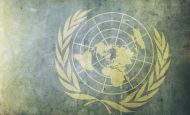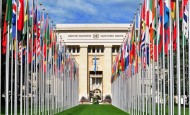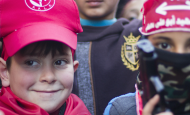Committee on the Rights of the Child Review of the Palestinians
Introduction
On January 28-29, 2020, for the first time, the Committee on the Rights of the Child (CRC) undertook a review of the “State of Palestine.”1 On February 13, the Committee published its Concluding Observations of this review process.
The primary purpose of the CRC review is to discuss and evaluate the situation relating to a country’s implementation of the Convention on the Rights of the Child. This treaty includes provisions to ensure children are protected against discrimination, violence, and armed conflict, and that they have access to education and health care.
As is often the case at the UN, the Palestinian delegation deflected countless questions posed by the Committee. Instead of taking responsibility for the lack of compliance with its treaty obligations, the Palestinian delegation blamed Israel for its failings. During the deliberations, some Committee members probed further and demanded answers that did not involve Israel.
The Concluding Observations highlight a number of such significant failures by the Palestinians to adhere to the Convention and the overall politicization of the CRC.
NGO Monitor Involvement
NGO Monitor played a significant role in the CRC review, providing a detailed submission to the Pre-session Working Group and a follow-up submission in response to a List of Issue’s of concern to the Committee. Our two submissions discussed the presence of incitement in the Palestinian educational curriculum, in the school system, and in TV programming targeting children. We also showcased the recruitment and use of Palestinian children to commit violent attacks against Israelis. Our staff travelled to Geneva to participate in the Committee’s review and met with Committee members.
Unfortunately, the CRC office itself has yet to post the two submissions presented by NGO Monitor and a submission presented by UN Watch. However, numerous submissions by Palestinian organizations and a submission by Human Rights Watch already appear on the CRC website. NGO Monitor has emailed numerous times and spoke with the CRC office in person, but as of February 19, the CRC has refused to post our submissions.
In this respect, it is noteworthy that all meetings and submissions to the CRC go through an NGO, Child’s Rights Connect. There is no transparency regarding how this NGO selects which NGOs to involve in the pre-trial sessions and why submissions are provided to them and not to the CRC directly.
Incitement
As mentioned, NGO Monitor presented a submission and a follow-up submission to the Committee in advance of the review.
Following NGO Monitor’s submissions and meetings, Committee Members raised questions during the oral review regarding incitement. Specifically, these experts noted “accusations that the State of Palestine was inciting children to violence against the occupying forces and inquired about measures taken to protect children from participating in the armed conflict against Israel” and inquired about measures taken about “the State of Palestine [being] engaged in rampant incitement of children to violence against the occupying force.” Another expert “inquired about the content of education and how textbooks promoted the concept of peace and tolerance; she also asked about measures to prevent children from going to school with guns and knives.”
In response, the Palestinians deflected, claiming that “there was no need for the State of Palestine to provoke or incite Palestinian children to demonstrate or engage in acts of violence against the occupation – acts of violence by the occupying forces they witnessed on a daily basis were enough, said the delegation.” The delegation did admit that Palestinians glorify terrorists, stating, “As for the glorification of martyrs, the delegation said that, like any other State and nation, Palestine also celebrated its heroes.”
The Committee’s Concluding Observations importantly highlight the above concerns, noting that they received “reports that the contents of some textbooks do not promote peace and tolerance as outlined in Article 29 of the Convention” and that the Palestinians should “Ensure that the contents of school curriculum are aligned with the aims of education as included in Article 29 of the Convention, and in particular promote peace and tolerance” (emphasis added).
It appears that, without NGO Monitor’s intervention, the Committee would not have discussed the issue of Palestinian textbooks. This suggests that the Committee relies heavily on NGOs instead of conducting independent investigation and analysis.
Recruitment and Use
Further reflecting NGO Monitor’s submissions and briefings, the Committee notes the existence of “recruitment and use of children in hostilities by non-State armed groups operating from the territory of the State party” and the importance of preventing “children’s participation in violence and apply all feasible measures to ensure their protection from the effects of hostilities and the care for child victims” (emphasis added). The Committee also calls on the Palestinians to prohibit “recruitment and involvement of children in hostilities, and take prompt measures to investigate, prosecute and sanction the perpetrators in cases of child recruitment” (emphasis added).
Blaming Israel
During the Q&A with the PA, Palestinian officials denied responsibility for violating their treaty obligations. For example, when questioned about the use and presence of violence in Palestinian schools, the Deputy Minister for Educational Affairs claimed that “what happens in school depends on what happens in society, therefore, violence in schools stems from the Israeli occupation.” Palestinian Minister of Social Development Ahmed Majdalani repeatedly claimed that the only need of his people was to “end the occupation and establish their own state and to enjoy sovereignty over its territories.” The Minister also “call[ed] on the international community…to support UNRWA and to urge the UN Secretary General to protect Palestinian children…and place the Israeli occupying authorities on the list of violators during armed conflict according to resolution 1612.” (See NGO Monitor’s report for details on the campaign to have Israel placed on this list of grave violators of child rights, which includes groups such as ISIS, Al Qaeda, and Boko Haram.)
Additionally, a significant amount of time was spent on a presentation by Dr. Izzeldin M M Abu EL Aish, a Palestinian doctor whose three daughters and niece were killed during the 2008-2009 Gaza war. Israel conducted an investigation into their deaths and found that they were the result of Palestinian armed groups “fighting from within a civilian population and storing weapons in the building where they died.” While this is undeniably tragic, decade-old events from the armed conflict in Gaza were completely irrelevant to the Committee’s mandate of reviewing Palestinian compliance with the Convention. In reality, the doctor was brought by the Palestinian delegation as a stunt to deflect from Palestinian non-compliance with international norms.
Concluding Observations
In sharp contrast with the Committee’s consistent challenging of the Palestinians during the oral review process, a significant amount of space in the Concluding Observations is dedicated to blaming Israel. For example, the Committee claims that it “recognizes that the ongoing Israeli occupation of the territory of the State party, the building of new settlements and its blockade of the Gaza Strip constitute a serious obstacle to the implementation of the rights enshrined in the Convention and lead to grave violations of children’s rights.” The Concluding Observations also reference alleged instances of Israeli “attacks on schools” without providing any citations. NGO Monitor research shows that these accusations originate with UNICEF, and particularly, with its implementing partner EAPPI (see NGO Monitor’s report “UNICEF and its NGO Working Group”).
NGO Submissions
As noted, despite the fact that the CRC has yet to post NGO Monitor’s submissions, other NGO submissions can be found on the UN body’s website, including those by Human Rights Watch (HRW), Defense for Children International – Palestine (DCI-P) and a coalition of other NGOs, and Al-Haq.
Numerous individuals with alleged ties to the Popular Front for the Liberation of Palestine (PFLP) terrorist organization have been employed and appointed as board members at DCI-P and its NGO co-author Health Work Committees. On June 26, 2018, UK Lawyers for Israel (UKLFI) announced that, after presenting evidence of the close ties between DCI-P and the PFLP to Citibank and Arab Bank PLC, “these banks no longer provide banking services to the terror linked NGO.” Al-Haq’s General Director also has ties to the PFLP terrorist organization and, as a result, has been denied exit visas by Israel and Jordan. In May 2018, Visa, Mastercard, and American Express shut down online credit card donations to Al-Haq.
For its part, HRW’s submission is off topic and primarily focused on alleged Israeli violations of the rights of the child. For instance, HRW decries Palestinian-Israeli security cooperation and falsely claims that Palestinian children are denied legal protections granted to Israeli children. Tellingly, HRW cites a discredited 2013 UNICEF report that was almost entirely based on unverified claims made by PFLP-linked and BDS-NGOs (see NGO Monitor’s report “The Origins of “No Way to Treat a Child”: Analyzing UNICEF’s Report on Palestinian Minors”).
Politicization and Violating its Mandate
On January 29, 2020, the CRC published its press release summarizing the review of the “State of Palestine” titled “State of Palestine to the Children’s Committee: Peace Proposal by President Trump is the ‘Theft of our Time’, not the ‘Deal of our Time.’” The fact that the CRC chose to emphasize a tangential aspect of the Palestinian delegation’s speech, which took place during the second day of the debate and only took a very limited amount of time, is a clear politicization of its mandate.
Footnotes
- In April 2014, as part of attempts to gain backing for claims of statehood, the “State of Palestine” acceded to nine human rights treaties, including the Convention on the Rights of the Child.




